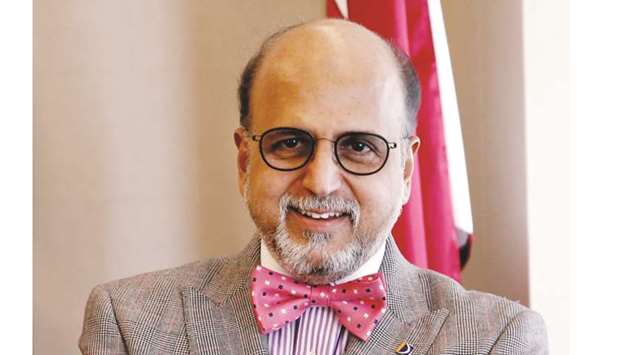Today there are 77.3mn Covid-19 cases globally and it has claimed the lives of more than 1.7mn people. To combat the crisis, central banks across the globe have announced adequate liquidity measures. The central banks have assured sustainability measures as per global norms. Approximately $30tn of liquidity is pumped globally. This liquidity has played a role in holding the balance, making sure economies don’t get crippled. Covid-19 has changed the way of doing business globally, work from home (WFH) culture has increased, and no one is any more location centric. Doha Bank operates in more than 20 countries globally, and reskilling and upskilling the human capital globally is the need of the hour.
Digital governance plays a key role in transforming an organisation globally. A 5% digital access can reduce carbon emissions nearly by 538mn tonnes, which is nearly 230mn coal mines’ capacity. This will ignite the growth of the green economy. Sustainable development has three distinct aspects and is also measured as triple-bottom line 1) Economic development, 2) Social development, and 3) Environment practice. The priority of leaders today for sustaining business growth is to focus on 1) Customers acquisition and servicing, 2) Market share and revenue, 3) Growth/expansion 4) Faster timeframe in marketing products and 5) Single view of customer and strengthening core competencies.
Today we are in the fourth industrial revolution, which is focused on adopting digital technologies, artificial intelligence, robotics, 3D printing, Internet of Things (IoT), combined with nano- and bio-technology and material sciences.
Continuous innovation is required for synchronising with the overall strategy. The approach is towards becoming a pioneer in providing consumer convenience — a bank for the future generation and young entrepreneurs. Product innovation is needed for making customers happy and retaining them. Product innovation needs to be focused on next generation.
According to the IMF in October 2020, the global growth is projected at 5.2% in 2021. The advanced economies’ growth is projected to strengthen to 3.9% and emerging and developing economies are expected to recover by 6% in 2021.
The US economy is projected to contract by 4.3% in 2020, before growing at 3.1% in 2021. A deeper contraction of 8.3% is projected for the euro area in 2020, reflecting a sharper downturn than in the US in the first half of the year. Inflation in the advanced economy group is projected at 0.8% in 2020, rising to 1.6% in 2021 as the recovery gains hold. In the emerging market and developing economy group, inflation is projected at 5% this year, declining to 4.7% next year.
Given the changing dynamics of business, Internet of Things is based on the fact that everything will be connected to each other i.e. multiple objects and devices working in tandem to seamlessly deliver solutions and services.
Research firm Gartner estimates that nearly 5.5mn new things are getting connected every day from 2016, while around 6.4bn connected things will be in use worldwide this year, up 30% from 2015. This number is set to reach a massive 20.8bn.
Areas where AI can be used in banking are a) AML pattern detection b) chat bots c) Algorithmic trading d) Fraud detection and e) Customer recommendations.
Robotics, enabled by artificial intelligence and machine learning is proving to be a game changer that can bring unique operational efficiencies to the financial services industry.
Reskilling and upskilling can result 1) Cost savings 2) Better productivity 3) Better allocation of ideal workers 4) No job losses and 5) Diversification of revenue for the organisation.
So it is important to consider reskilling and upskilling, which is the need of the hour.
* The author is Group CEO of Doha Bank.

Dr R Seetharaman
